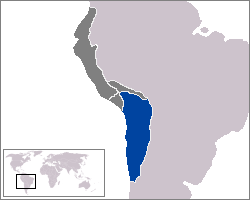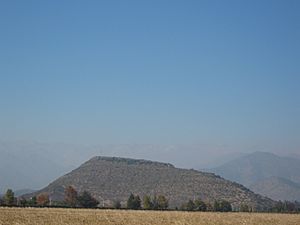Pukara of La Compañía facts for kids
Pukara de La Compañia is an ancient fortress found on a big hill. It's near the village of La Compañia in Chile. A "pukara" is a type of fort built by ancient people. This site was first used by the promaucae people. Later, the Incas also used it.
This pukara is special because it's the most southern building left from the Inca Empire. It's an important stop on "The Chilean Inca Trail". The Chilean government has even called it a National Monument.
Contents
History of the Pukara

The Pukara de La Compañia was used during three main times in history:
- Around 1380 to 1450 A.D.: Local people, like the Promaucaes or picunches, lived on the hill. They used the fort to fight against the Inca invasion.
- Around 1430 to 1450 A.D.: Most of the buildings and things found at the site are from when the Incas were there. They built many of the structures you can still see today.
- During the Spanish Conquest: The local people used the fortress again. This time, they were fighting against the Spanish who were trying to take over Chile. Old Spanish books talk about this fort. These writings helped archeologists find and study the Pukara just a few decades ago.
What the Pukara Looks Like
Ancient Buildings
The Pukara de La Compañia has the foundations of seven round buildings. There's also one main building and other smaller ones nearby. These smaller buildings might have been used as lookout spots. The top of the hill is also surrounded by strong walls. These walls were built to protect the fort.
How It Is Today
Pukara La Compañia was made a Chile National Monument in 1992. This means it's a very important historical place. However, it's not easy for visitors to get to the site. Also, the government doesn't always take care of it or protect it well.
For example, in 1997, a large antenna for cell phones was put on top of the hill. To build this antenna, they made a road and moved a lot of dirt. This sadly destroyed about 4 meters (13 feet) of one of the old defensive walls.
Good news! In 2012, a company called O’Higgins Tours started a project. They are working with a designer to create a digital model of the site. This model will show what the pukara looked like in the past. It's for teaching people about the site and is partly paid for by the Chilean government.
See also
 In Spanish: Pucará de La Compañía para niños
In Spanish: Pucará de La Compañía para niños


